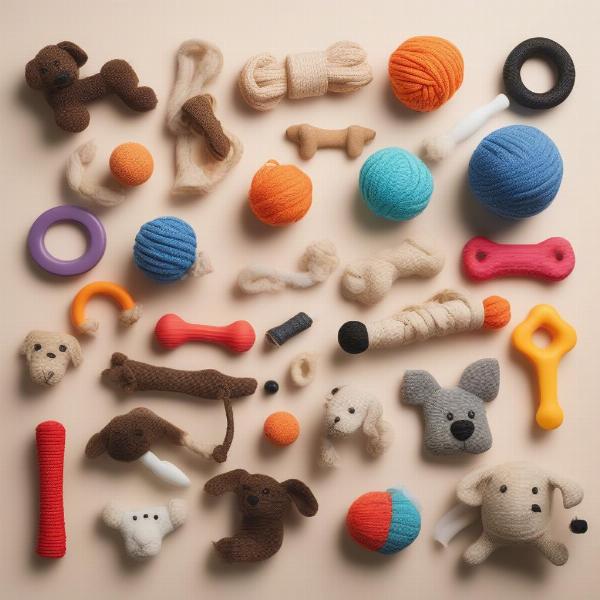Chewing is a natural and necessary behavior for dogs of all ages, breeds, and sizes. It’s not just about having fun; chewing serves several important purposes for our canine companions, from puppyhood to senior years. Understanding why your dog chews can help you address any destructive chewing habits and provide appropriate outlets for this instinctual drive.
Why Do Dogs Chew?
Dogs chew for a variety of reasons, and understanding these can help you manage this natural behavior. For puppies, chewing helps relieve the pain of teething, much like it does for human babies. As adult dogs, chewing helps keep their jaws strong and their teeth clean. Chewing also releases endorphins, which have a calming effect and can help reduce anxiety and boredom. Finally, for some dogs, chewing is simply a pleasurable activity, like a hobby.
Teething Puppies
Puppies explore the world with their mouths, and chewing is a big part of that exploration. From 4 months to 7 months, the discomfort of teething drives puppies to chew on anything they can get their paws on. Providing safe and appropriate chew toys is crucial during this stage to prevent them from developing a habit of chewing on furniture or other inappropriate items.
Adult Dogs and Chewing
Even after the teething phase, adult dogs retain a strong need to chew. It helps maintain their dental health by scraping away plaque and tartar buildup. It also provides mental stimulation and can prevent boredom, which can lead to destructive behaviors. For working breeds and high-energy dogs, chewing can be a valuable outlet for pent-up energy and frustration.
Chewing as a Stress Reliever
Just like humans might fidget or bite their nails when stressed, dogs often turn to chewing as a coping mechanism. Providing a variety of chew toys, especially during times of change or stress, can help your dog feel more secure and comfortable. This can be particularly important during events like moving house, introducing a new pet, or loud noises like fireworks.
Choosing the Right Chew Toys
Selecting appropriate chew toys is essential for encouraging healthy chewing habits. Avoid toys that are too small or could easily be swallowed, as these can pose a choking hazard. Look for durable toys made from non-toxic materials that can withstand your dog’s chewing power. yak chew dog can be a good choice for strong chewers.
 A variety of dog chew toys including ropes, rubber toys, and bones
A variety of dog chew toys including ropes, rubber toys, and bones
Addressing Destructive Chewing
If your dog is engaging in destructive chewing, it’s important to address the underlying cause. This might be boredom, anxiety, lack of exercise, or simply not having enough appropriate chew toys. Providing plenty of physical and mental stimulation, along with a no chew dog harness when unsupervised can help deter unwanted chewing. You can also try a diy no chew dog spray to deter chewing on furniture. Consider root chew dogs as a healthy and long-lasting chew option. Ensure they have comfortable and durable anti chew dog bedding.
Conclusion
Chewing is a fundamental aspect of a dog’s life, contributing to their physical and emotional well-being. By understanding why dogs chew and providing them with appropriate outlets for this natural behavior, we can help them live happy, healthy, and fulfilled lives, while also protecting our belongings!
FAQ
- Why does my dog chew on everything? This can be due to teething, boredom, anxiety, or simply a lack of appropriate chew toys.
- What are the best chew toys for puppies? Soft rubber toys, teething rings, and rope toys are good choices for puppies.
- How can I stop my dog from chewing on furniture? Provide plenty of appropriate chew toys, use deterrents, and ensure your dog gets enough exercise and mental stimulation.
- Is it normal for adult dogs to chew? Yes, chewing helps maintain dental health and provides mental stimulation for adult dogs.
- What should I do if my dog swallows a piece of a chew toy? Contact your veterinarian immediately.
- Are there any natural chew toys for dogs? Yes, items like antlers, bully sticks, and certain types of wood can be safe and enjoyable for dogs to chew on.
- How often should I replace my dog’s chew toys? Replace any toys that are broken, frayed, or pose a choking hazard.
ILM Dog is a leading online resource for dog owners worldwide, providing expert advice on all aspects of dog care and wellbeing. From breed selection and health care to training, nutrition, grooming, and product recommendations, we are dedicated to helping you provide the best possible care for your canine companion. We offer in-depth articles, expert tips, and a supportive community to help you navigate every stage of your dog’s life. For further information or any questions, please don’t hesitate to contact us. Email: [email protected] Phone: +44 20-3965-8624. Visit ILM Dog today!